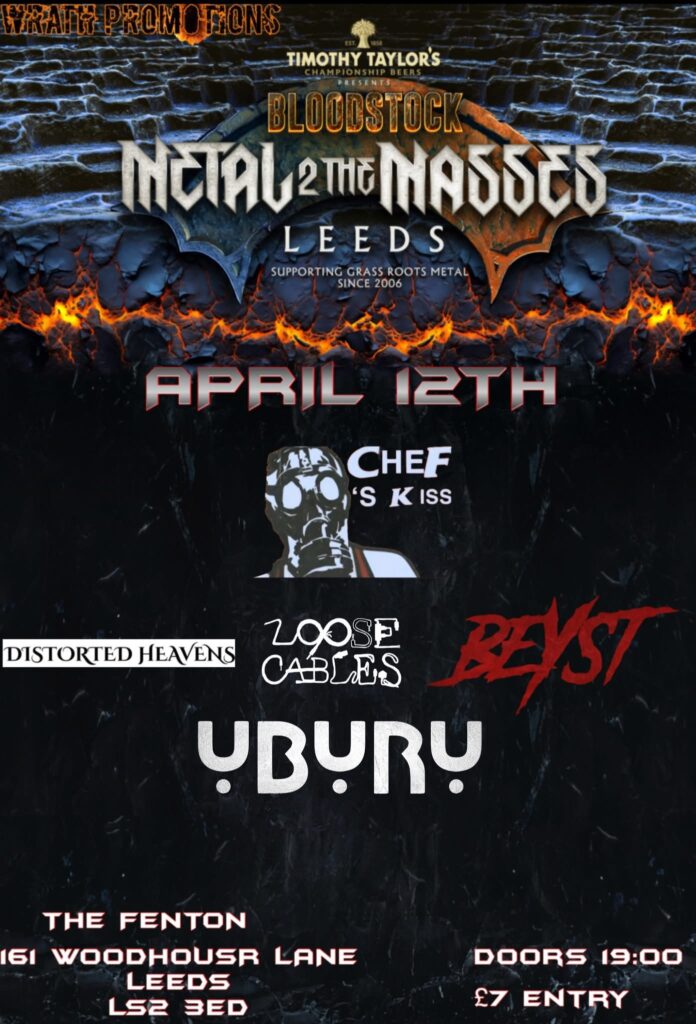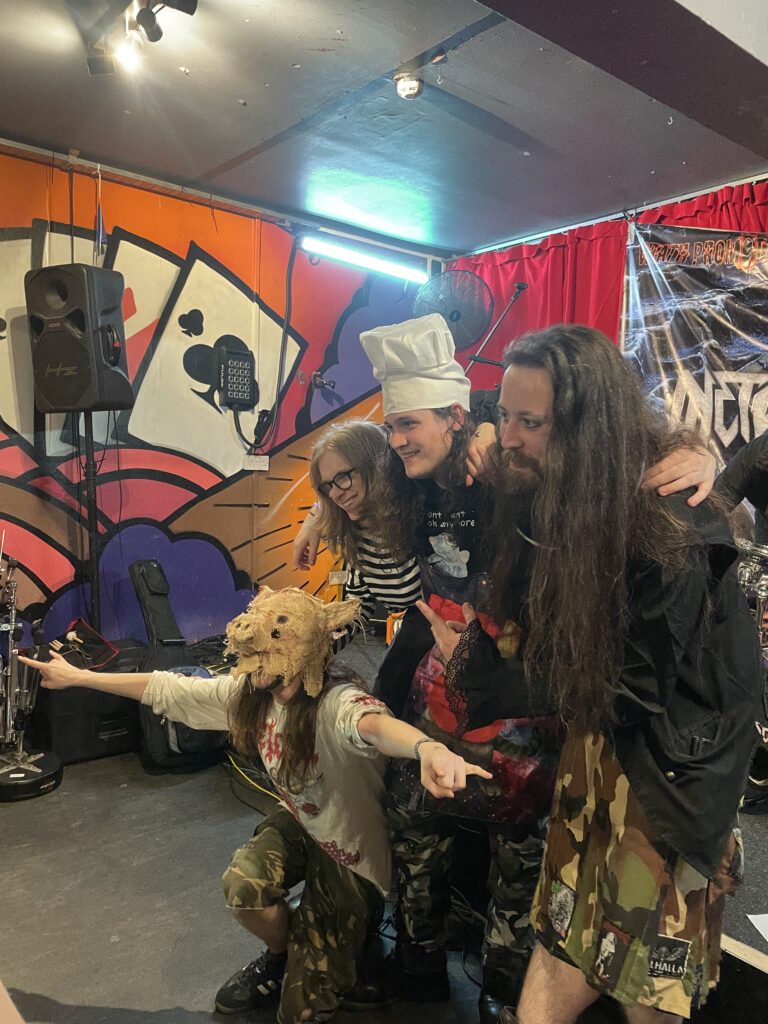The Fenton, Leeds, 12/4/2025


Bloodstock’s Underground Pulse: Grassroots Metal, Feeling Communities, and the Rise of Chef’s Kiss
On April 12th, in the humid chaos of The Fenton in Leeds, grassroots metal was alive and unfiltered. The Metal 2 the Masses competition, part of Bloodstock Festival’s long-standing initiative to discover and promote underground UK talent, delivered a cracking night of riffs, sweat, and surprises. And, I was beyond thrilled to see that it was my friends in Chef’s Kiss, a culinary-themed comedy slam/extreme metal band, who walked away victorious, securing their place in the semifinals on May 3rd.
But what we witnessed was more than a great performance. It was a moment of collective meaning-making — an affirmation of the emotional, symbolic, and cultural importance of grassroots metal scenes in Britain today.
A Scene with Stakes: Why Grassroots Metal Still Matters
Bloodstock’s Metal 2 the Masses scheme — now expanded across the UK in 2025 — aims to “nurture and discover future main stage artists” while supporting independent venues and promoters who keep the scene alive at the ground level (Metal Planet Music, 2024).
Events like this are about more than winning a festival slot. They embody what Nicola Allett (2010, p. 313) calls a “feeling community”: a subcultural formation grounded not just in shared aesthetics, but in emotional investments and kinship forged through collective sonic experience. At The Fenton, every headbang, pint drunk and burst of laughter at a food-themed lyric, was a form of affective participation in that shared subcultural identity.
Fast Food Fury and Playful Power
Chef’s Kiss deliver blast beats with burger jokes, brutal vocals in aprons and Chef’s toques. Their set was tight, intense, and, importantly — funny. This matters.
Allett observes that while extreme metal fans often frame their experience in terms of seriousness, power, and intensity, they also engage with “performative labours” and creative self-expression through shared emotional codes (2010, p. 240). Chef’s Kiss tap into that by flipping the tropes: the seriousness becomes parody, and the parody becomes a new mode of meaning.
Their act shows how affect in metal doesn’t always need to be grim or masculine. It can be surreal, satirical, and deeply social. That emotional flexibility is a marker of a vibrant subculture, not a fractured one.
Heritage Narratives and Northernness Reimagined
Even parody-laced performances like Chef’s Kiss play a part in what Spracklen, Lucas, and Deeks (2014, pp.2-4) describe as the “construction of heavy metal identity through heritage narratives.” While some northern extreme metal bands rely on mythology and nationalism, bands like Chef’s Kiss reflect a more playful — but no less meaningful — regional identity. They don’t evoke Saxon warriors and Nordic legends; they evoke chippy teas and post-pub carnage. That’s still Northernness — just with a twist.
Even their Fringe Fest 2024 slot contributes to what Laurajane Smith (2006) would call “intangible heritage”: community-based, emotionally resonant, and rooted in the practice of shared culture and identity performance.
By distorting and reimagining extreme metal’s usual historical mythologies through absurdist performance, Chef’s Kiss are contributing to the evolution of what “northern metal” can mean.
Imagined and Imaginary Communities
Rosemary Lucy Hill (2014, p. 13) offers a framework for understanding metal fans through the concept of “imaginary community”: the idea that fans imagine themselves as part of an egalitarian, inclusive collective — but that ideal often clashes with lived experience.
Events like Metal 2 the Masses complicate that further. They show the scene striving to become more inclusive — not just by elevating new bands, but by expanding what ‘metal’ is allowed to look and sound like. In that context, Chef’s Kiss don’t undermine the community. They reimagine it.
Conclusion: Mayhem, Meaning, and Metal
Chef’s Kiss’s win isn’t just about talent. It’s about how their act resonates within the symbolic and emotional codes of metal fandom. These bands and fans are the custodians of the scene. And competitions like Metal 2 the Masses don’t just find the next big thing — they keep the flame burning for everyone in the pit, the pub, and the page.
Chef’s Kiss will now go on to the Leeds semifinals on May 3rd — and regardless of the outcome, they’ve already proven the vitality of what Allett (2010, p. 322) calls “love’s labours”: the emotional, performative, and community-driven practices that make up grassroots metal culture.
If you’re someone who talks about “supporting the scene” — this is how you do it. Buy the ticket. Share the post. Scream the lyrics. Whether it’s in a dingy pub basement or a field in Derbyshire, the soul of metal lives in moments like these.
References
Allett, N. (2010). Love’s Labours: Extreme Metal Music and its Feeling Community (Doctoral dissertation, University of Warwick). Retrieved from http://wrap.warwick.ac.uk/3110
Hill, R. L. (2014). Reconceptualising hard rock and metal fans as a group: imaginary community. International Journal of Community Music. Retrieved from http://eprints.whiterose.ac.uk/id/eprint/78243
Metal Planet Music. (2024, November 9). Bloodstock launches 2025 Metal 2 the Masses grass roots scheme across the UK. Retrieved from https://metalplanetmusic.com/2024/11/bloodstock-launches-2025-metal-2-the-masses-grass-roots-scheme-across-the-uk/
Smith, L. (2006). Uses of Heritage. Routledge.
Spracklen, K., Lucas, C., & Deeks, M. (2014). The construction of heavy metal identity through heritage narratives: A case study of extreme metal bands in the North of England. Popular Music and Society, 37(1), 48–64. Retrieved from https://doi.org/10.1080/03007766.2012.724605
